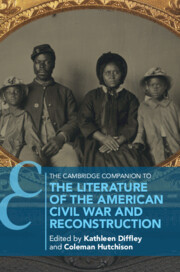Book contents
- The Cambridge Companion to the Literature of the American Civil War and Reconstruction
- The Cambridge Companion to the Literature of the American Civil War and Reconstruction
- Copyright page
- Dedication
- Contents
- Figures
- Contributors
- Acknowledgments
- Chronology
- Introduction
- Part I The Blind Ruck of Event
- Part II Worlds Made and Remade
- Suggestions for Further Reading
- Index
- Cambridge Companions to …
Introduction
Published online by Cambridge University Press: 04 August 2022
- The Cambridge Companion to the Literature of the American Civil War and Reconstruction
- The Cambridge Companion to the Literature of the American Civil War and Reconstruction
- Copyright page
- Dedication
- Contents
- Figures
- Contributors
- Acknowledgments
- Chronology
- Introduction
- Part I The Blind Ruck of Event
- Part II Worlds Made and Remade
- Suggestions for Further Reading
- Index
- Cambridge Companions to …
Summary
In a scathing November 2018 editorial published in The Guardian, public intellectual Rebecca Solnit connected a series of violent white supremacist acts in Charleston, Charlottesville, and Pittsburgh to the Civil War and Reconstruction. Writing with characteristic verve, Solnit concluded, “If you are white, you could consider that the Civil War ended in 1865. But the blowback against Reconstruction, the rise of Jim Crow, the myriad forms of segregation and deprivation of rights and freedoms and violence against black people, kept the population subjugated and punished into the present in ways that might as well be called war.”1 Solnit’s was in many ways a representative argument during the age of Donald Trump, whom Solnit deemed “an openly Confederate president.” In a moment of intense political division and social strife, many critics and commentators find themselves returning to this difficult period in American history in search of precedent.
- Type
- Chapter
- Information
- Publisher: Cambridge University PressPrint publication year: 2022

